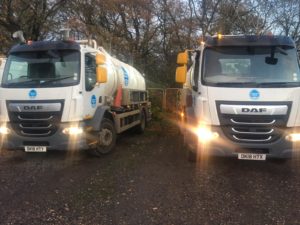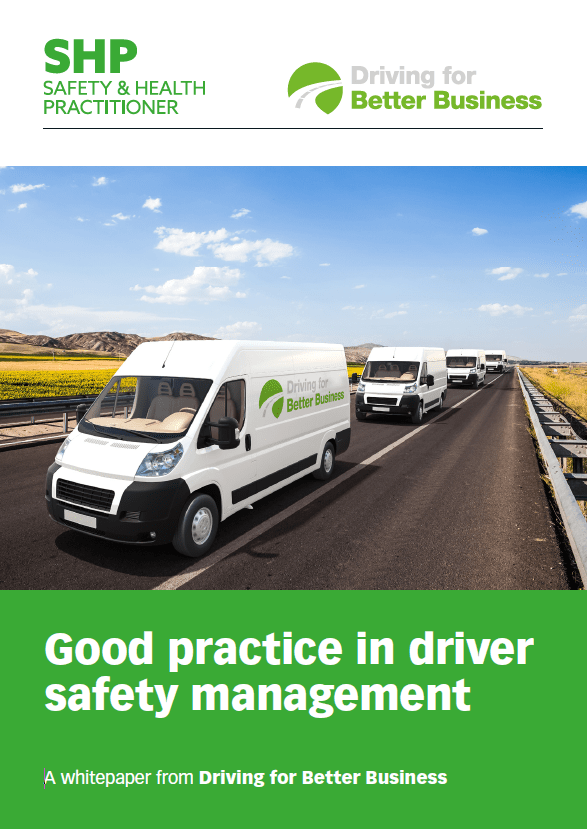Most of us jump into our cars and drive away thinking about everything else but driving… am I going to be late, what is the traffic like, where is my phone etc. How many of us actually stop and make a conscious effort to think about the speed we will be travelling at, what the road conditions are like or about the other road users? Gordon Rickards, Health, Safety & Wellbeing Manager for Operations Support at Thames Water, explains how the business refocused it’s attention on road safety.
 Road Safety week ran from 16-22 November this year and the theme was ‘No need for speed’. It should have been an opportunity for most of the 32 million UK road users to take stock of what it means to drive or ride on the road in 2020. For 34 families it was a week they will never forget as 34 people are killed on UK roads every week.
Road Safety week ran from 16-22 November this year and the theme was ‘No need for speed’. It should have been an opportunity for most of the 32 million UK road users to take stock of what it means to drive or ride on the road in 2020. For 34 families it was a week they will never forget as 34 people are killed on UK roads every week.
Apologies for starting in such a sombre manner, but I wanted to set the scene and to get you thinking. Don’t worry it won’t all be doom and gloom. Hopefully by the end of this article, I will have given you food for thought and maybe even placed a smile on your face!
Road safety week started in 1997 and is the UK’s biggest road safety event. Like most awareness weeks, its job is to inspire thousands of schools, organisations and communities to act on road safety and promote life-saving messages during the week and beyond. It is coordinated by Brake, the road safety charity who reached out and asked us to get involved.
At Thames Water we have a fleet of roughly 2,000, which covers everything from 40 tonne tankers to electric golf carts. Our supply chain takes this total to over 10,000 vehicles, which spend most of the time on the public highway.
We asked the team at Brake why speed was chosen as the theme for this year. They explained, ‘in a crash, 1mph can mean the difference between life and death, but we know that people still regularly break speed limits or travel too fast for the conditions of the road. With someone injured on a UK road every four minutes, and vehicle speed playing a part in every crash, it’s time to come together to say that there is No Need for Speed. The formula is simple: the higher the speed, the longer the stopping distance, the harder the crash and the greater the risk of death and injury. ‘No need for speed’ is a reminder to everyone of how the speed they travel affects other people.’
Key risks
 Our Head of Logistics & Fleet, Karl Baker brought the campaign to my attention and we just had to get involved. We arranged a start up meeting with key individuals from the business and brainstormed how this would work and what we wanted to achieve. It soon became clear that we seemed to have missed driving as one of our key risks. We spend vast amounts of time thinking about chemical safety, working at height or construction. Driving or using the highway is one of the few risks which can affect all of us everyday of our lives and where we appear to have lost focus. We eventually settled on five themed days which we hoped would engage everyone in our business and wider supply chain. Teams and individual were asked to create short videos which were to be released on the themed days and published on a shared area which would be available during the week and after for those who may have missed them first time around.
Our Head of Logistics & Fleet, Karl Baker brought the campaign to my attention and we just had to get involved. We arranged a start up meeting with key individuals from the business and brainstormed how this would work and what we wanted to achieve. It soon became clear that we seemed to have missed driving as one of our key risks. We spend vast amounts of time thinking about chemical safety, working at height or construction. Driving or using the highway is one of the few risks which can affect all of us everyday of our lives and where we appear to have lost focus. We eventually settled on five themed days which we hoped would engage everyone in our business and wider supply chain. Teams and individual were asked to create short videos which were to be released on the themed days and published on a shared area which would be available during the week and after for those who may have missed them first time around.
Day one
An introduction from Karl Simons our Chief Health, Safety & Wellbeing Officer, opening the week and setting the stage. Karl said: “Each day when you get in your car, get on your bike, or even begin walking along the pavement, you’re taking a calculated risk. When you start your journey, you are trusting in your ability to drive, and the ability of those around you. When you get in your vehicle, whether that’s for work or in your home life, make sure you’re safe to drive. Make sure you’re fully alert, remove distractions, take your time and please don’t speed – no journey is so important that you have to put yourself or others at unacceptable risk.”
We also had Andy Hare, Strategic Adviser, with over thirty years’ experience of commercial vehicles. Andy took us through a road traffic collision involving a tanker which overturned on a roundabout. Thankfully no one was injured, but it was fascinating to see how speed, mass and inertia can all contribute to incidents in ways we never expected.
Day two
A themed ‘Day in the life of’ – it featured Kevin Pollock and Roger Davis, two of our most experienced LGV drivers, with 48 years between them. They both spoke eloquently about the responsibility they feel when driving vehicles which can weigh up to 40 tonnes, how it is important to plan and having the increased awareness of other road users. We also had Gareth Mullen, H&S Reporting Manager, who is a keen cyclist and recently completed a sponsored ride for the Autistic society. Gareth donned a Go-Pro and filmed is daily commute to the office, queue lots of references to men of a certain age in Lycra! This really brought it home, we were able to experience vehicles passing too close, pedestrians stepping out without warning and the general lack of awareness shown by other road users.
Day three
 Our ‘Test your Knowledge’ event. This was made up of a series of hazard perception, brake distance and vision tests ending with a general driving quiz. We had a children’s poster competition and enlisted the help of National Tyres to undertake free tyre checks at two of our larger sites.
Our ‘Test your Knowledge’ event. This was made up of a series of hazard perception, brake distance and vision tests ending with a general driving quiz. We had a children’s poster competition and enlisted the help of National Tyres to undertake free tyre checks at two of our larger sites.
Day four
Led by our partners and included an insightful interview with James Alexander from Agility Alliance, who also chairs the Occupational Road Risk forum. James said, “Everyone has a responsibility to drive on our roads in a careful and considerate manner, Road Safety Week is our chance to show our commitment to road safety for our people, our customers, and our communities”. James spoke passionately about the importance of the forum, how Thames Water, with the 15 partners are sharing best practice and looking at innovative ways of improving driver performance.
Day five
The synopsis of the week, with an announcement of the competition winners and a closing message from Karl Baker. Karl said: “We averagely undertake 73K driving hours per month at Thames Water and during those hours, even though its often only by a few miles per hour, our telematics tell us we often break the speed limit. Remember the speed limit is a limit not a target to aim for!”
There is so much more we can do to change behaviour, and this is just the start of our journey. We have started thinking about ideas for next year, partnering with the wider local communities and schools to hold joint events. Asking how we can really capitalise on the focus Road Safety Week have given us. Looking back at the week I believe it was a great success.
We received lots of positive feedback from our employees and our click rates were a lot higher than expected. We are in the middle of the COVID-19 pandemic, but this has not stopped the work we undertake. Our drivers are still out on the roads every day providing one of life’s essential services.
In the last year our vehicles have spent over 878,000 hours driving, equivalent to 100 years, traveling over 19 million miles or around the world 763 times. During this time, we have been involved in a driving related collision every 42,000 miles. It has made us all look at driving and road use in a new light. How can we make it safer for everyone? Can we do more to change behaviour? How do we improve driver competency? With the change to fuel use in 2030 what does that look like for us?
I hope after reading this, the next time you get into a vehicle, adjust the seat, check the mirrors, turn the key and pull off you think there really is no need for speed.
This eBook will guide you through some of the key understandings you need to be able to manage driver safety effectively and, at the end, provide a series of free resources you can access to help you ensure your own driver safety management system is robust, legally compliant and in line with industry-accepted good practice.
Download this eBook from Driving for Better Business and SHP to cover:
- Why do we need to manage driver safety?
- Duty of care – a shared responsibility;
- Setting the rules with a driving for work policy;
- Managing driver safety;
- Ensuring safe vehicles;
- Safe journeys and fitness to drive;
- Record keeping;
- Reporting;
- The business benefits of good practice;
- Additional resources

 Road Safety week ran from 16-22 November this year and the theme was ‘No need for speed’. It should have been an opportunity for most of the 32 million UK road users to take stock of what it means to drive or ride on the road in 2020. For 34 families it was a week they will never forget as 34 people are killed on UK roads every week.
Road Safety week ran from 16-22 November this year and the theme was ‘No need for speed’. It should have been an opportunity for most of the 32 million UK road users to take stock of what it means to drive or ride on the road in 2020. For 34 families it was a week they will never forget as 34 people are killed on UK roads every week. Our Head of Logistics & Fleet, Karl Baker brought the campaign to my attention and we just had to get involved. We arranged a start up meeting with key individuals from the business and brainstormed how this would work and what we wanted to achieve. It soon became clear that we seemed to have missed driving as one of our key risks. We spend vast amounts of time thinking about chemical safety, working at height or construction. Driving or using the highway is one of the few risks which can affect all of us everyday of our lives and where we appear to have lost focus. We eventually settled on five themed days which we hoped would engage everyone in our business and wider supply chain. Teams and individual were asked to create short videos which were to be released on the themed days and published on a shared area which would be available during the week and after for those who may have missed them first time around.
Our Head of Logistics & Fleet, Karl Baker brought the campaign to my attention and we just had to get involved. We arranged a start up meeting with key individuals from the business and brainstormed how this would work and what we wanted to achieve. It soon became clear that we seemed to have missed driving as one of our key risks. We spend vast amounts of time thinking about chemical safety, working at height or construction. Driving or using the highway is one of the few risks which can affect all of us everyday of our lives and where we appear to have lost focus. We eventually settled on five themed days which we hoped would engage everyone in our business and wider supply chain. Teams and individual were asked to create short videos which were to be released on the themed days and published on a shared area which would be available during the week and after for those who may have missed them first time around. Our ‘Test your Knowledge’ event. This was made up of a series of hazard perception, brake distance and vision tests ending with a general driving quiz. We had a children’s poster competition and enlisted the help of National Tyres to undertake free tyre checks at two of our larger sites.
Our ‘Test your Knowledge’ event. This was made up of a series of hazard perception, brake distance and vision tests ending with a general driving quiz. We had a children’s poster competition and enlisted the help of National Tyres to undertake free tyre checks at two of our larger sites.